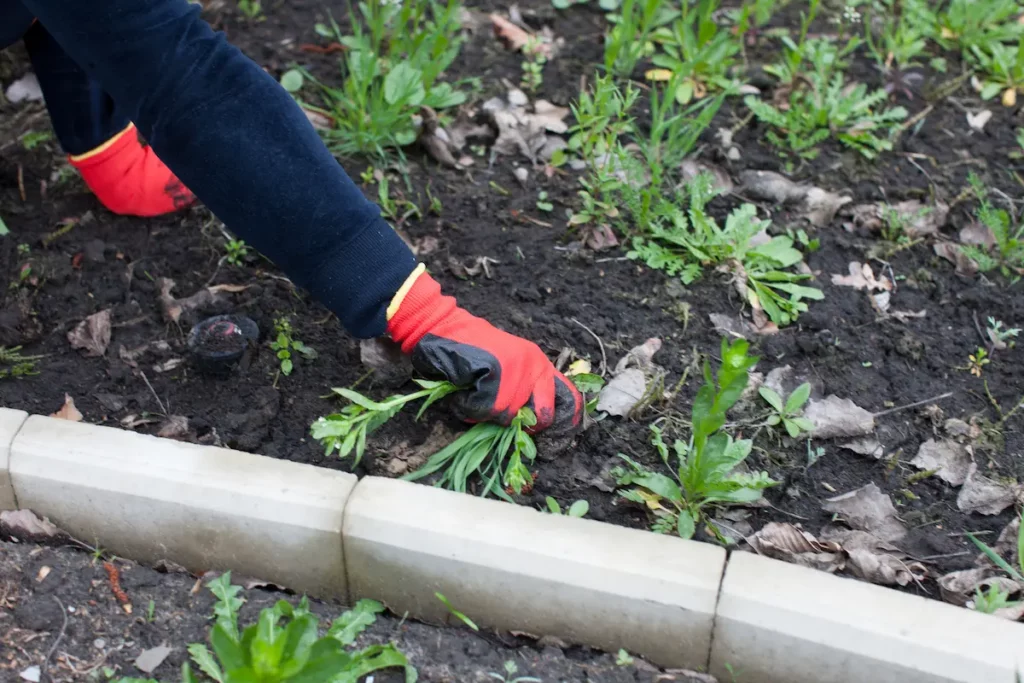While it is possible to use bleach to kill weeds, it is not a recommended method.
This practice can have negative effects on the soil and can also pose health risks to animals and humans.
It is essential to approach this method cautiously and in a controlled manner.
Your front and back yard are stunning with their beautiful flora and fauna. They are your pride and joy.
However, the appearance of weeds threatens to mar the spectacular visual display of colors. You may have considered using bleach to tackle them.
But is it a viable option?
If you are still tempted to use bleach to kill weeds, read on.

Related Reading: Will Bleach Kill Bushes? Is It Effective?
Table of Contents
How to Use Bleach to Kill Weeds
Before using bleach, it is crucial to verify if it is permitted in your region.
Reach out to your local government to inquire about applicable regulations.
Bleach can seep into the ground and persist for multiple weeks.
It’s possible that the absence of weeds in your area could be seen as a positive outcome.
However, it’s essential to consider if you use bleach to kill weeds, it can alter the soil’s acidity due to its chemical properties.
If there is any excess runoff into an adjacent property, it could result in a significant issue.
If you are permitted to use bleach in your area, it is important to exercise caution.
Additionally, ensure that you prioritize your safety by wearing protective equipment such as safety goggles, a mask, and gloves.
How to Apply Bleach
Before spraying bleach to kill weeds, ensure that there is no wind outside to prevent it from spreading onto other plants or your lawn.
Additionally, it is vital to use the correct amount of bleach, but the specific amount depends on the size of the weeds.
The amount of bleach needed to kill weeds depends on their size and can vary.
It’s best to experiment with different concentrations of bleach to find what works best.
Remember that using higher concentrations of bleach will kill weeds faster, but it can also harm your soil. To be safe, use 16 parts water to 1 part bleach.
If you are concerned about causing too much damage to your garden, dilute the bleach as much as possible.
To use the weed spray, fill it with water and add bleach. Then attach it to your garden hose and turn on the water.
When spraying, keep the nozzle as far away from plants as possible to avoid accidentally spraying them. This will prevent damage to your plants while using bleach to kill weeds.
Also, be sure to adjust the spray head to a closed position when not in use to avoid any accidental spraying.
Finally, concentrate the spray over the weeds to effectively kill them.
To effectively kill weeds, concentrate the spray over them by positioning the head of the sprayer close to the weed. This will ensure that the spray is concentrated over the weeds.
You May Have to Repeat the Process
Before moving to a new area of the garden, it’s important to release your grip on the trigger of the sprayer completely.
This will prevent accidentally spraying the wrong thing. You may need to repeat this process depending on the strength of the concentration.
The hardier weeds may require several applications of bleach to kill weeds.
If you find that the weeds have died, then pull them out from the garden.
Related Article: How to Use Chlorine Bleach Around Plants
Alternative: Killing Weeds Without Bleach
Bleach will eventually break down after exposure to sunlight and rain.
It can take a couple of days, at least before it starts to weaken.
However, if you are concerned about the environmental impact that bleach has, you can try these other options.
Water and Salt
After exposure to sunlight and rain, it may take at least a couple of days before the material weakens.
Here is the method:
- Add water and salt to a pot. You want to use a water-to-salt ratio of 2:1. So two cups of water to one cup of salt.
- Boil your mixture and stir so that the salt mixes into the water.
- Let your solution cool down.
- Pour it into your garden sprayer and use it on the weeds.
Baking Soda
Baking soda similarly attacks weeds as salt does. That is, it absorbs the water from the plant. The weed eventually dries out and dies.
To remove the weeds using baking soda, you have two options available.
1. Apply straight on the plant
Sprinkle the baking soda into the leaves and other exposed weed parts. You can then spray over the weed with water or allow nature to do it for you with rain.
2. Make a solution
Pour water into a bowl and then add your baking soda. The more soda you use, the stronger your solution will be. Mix so that the baking soda dissolves.
Transfer the solution to a garden sprayer. Add in several drops of dishwashing liquid, as this will help the baking soda stick to the weed.
Hot Water
To effectively eliminate weeds in your garden, you can try boiling water. This method will cause the cell structure of the weed to fall apart, leading to its death.
Be careful with this idea, as you don’t want to burn yourself. Also, take care so you don’t get the hot water on other plants (or helpful garden bugs).
Lemon Juice
If you wish to attack weeds, try using lemon juice. The acidity in the lemon juice will gradually erode the weeds.
The amount of juice required depends on the number of weeds you have. For optimal results, implement this approach when the weather is hot and sunny. You could even make some lemonade to treat yourself.
Be Safe
Earlier, we discussed the safety measures that must be taken while handling bleach.
Since it is a potent chemical, it can be dangerous if it comes in contact with your eyes or if you inhale it.
It is important to keep children and animals away from the garden both during and after spraying.
Animals, being naturally curious, may be tempted to snack on the greenery in the garden.
Continue Reading: Does Bleach Kill Millipedes? Yes, But This Is Better.
Conclusion
Although it is possible to use bleach to get rid of weeds, many gardening experts advise against it as it can cause permanent harm to your garden.
Just because it can be tricky doesn’t mean you can’t bleach your weeds.
When applying the bleach, take care to avoid accidentally getting it on your flowers and other desirable plants.
It’s best to choose a calm day to do this so that the bleach doesn’t get blown around by the wind.
There are alternative methods to using bleach that are equally effective in eliminating weeds, and they are more natural.
Enjoy living the outdoor life!!!
